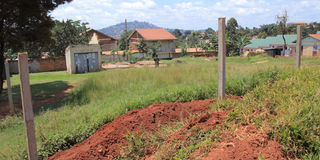Don’t be duped in land deals

Land in Makindye. For every land transaction, due diligence must be done to minimise fraudulent transactions. PHOTO/Rachel Mabala
What you need to know:
Some unscrupulous elements take advantage of the provision in our laws for the issuance of “special certificates of title,” Alex Matovu writes.
Worldwide, real estate enjoys the reputation of being the safest investment option. For Uganda however, fraud in this sector remains a glaring challenge as it lurks through real estate agencies, land registries, court rooms, and commissions of inquiry among other public and private avenues.
But what is fraud? Ugandan courts have defined fraud as “an intentional perversion of the truth by a person for the purpose of inducing another in reliance upon it to part with some valuable thing belonging to them or to surrender a legal right.” Simply put, fraud includes acts or omissions whose intent is deception of another to gain an advantage or cause another to lose a legal right or entitlement. Where such a deception is involved in dealing with a resource as valuable as real estate, there is great cause for concern.
Many a layperson will be surprised that such a deception could happen so imperceptibly that it would be difficult to prove in an instant. But we are usually so caught up in the excitement of concluding deals that we rarely bother to safe guard against the possibility that we may have dealt with someone not so honest, or that someone may have taken us for a ride.
It may be easier to understand the nature of fraud and how close it is if we examined some of its common incidences. Besides the more obvious forgery of titles, powers of attorney, illegal removal of caveats, under declaring the value of the transactions, we also have administrators of estates transferring property to themselves or third parties without recourse to beneficiaries.
There are also unscrupulous elements who take advantage of the provision in our laws for the issuance of “special certificates of title”. This provision was intended to cater for situations where the owner’s copy of the certificate of title is lost, destroyed, or irredeemably obliterated. Fraudsters, however, have taken advantage of this rather helpful process, to create special titles under false pretenses and then transfer the same to unsuspecting third parties.
While the victims of such fraud may resort to Court for appropriate remedies, the legal burden of proof is a notch higher than the balance of probabilities ordinarily demanded in civil matters. Even where the law provides for a last resort to the owner that loses their land to fraud to pursue compensation from the government, the tediousness of that process seldom makes up for the value of the property lost to fraud.
Usually, fraud is undertaken by unsavory opportunists, emboldened by the fact that their victims rarely bother with some basic steps that would avert them or at least significantly reduce the fraudsters’ chances. To this end, the words ‘due diligence’ must cease to be some legalese and become an indispensable requirement for every land transaction no matter who the party on the other side is. As an intending purchaser of land, one must check for the status of ownership, history of the land, and any overlapping interests that may cause you worry in the future.
This means you must conduct a formal search at the land registry and obtain a search certificate or report, visit the property and see what the locals have to say about it, and ensure that a boundary opening exercise is conducted by a registered surveyor or firm of surveyors. An intending purchaser must ensure that a well drafted Land Sale Agreement is prepared and duly executed with the seller of the property in the presence of at least two witnesses. In sum, due diligence should go past taking one’s seller at face value and assuming everything they say is true. Thoroughly investigate the person and property and ascertain that the two correspond.
Realities such as the purchaser not being in Uganda, may make it difficult for some people to adhere to all these recommended steps. Always involve lawyers and surveyors you can trust. While building trust requires time, it is inevitable if we are to succeed at investing in this lucrative but rather risky sector. Good legal representation for example helps one take advantage of what Louis J. Freeh called the fraudster’s greatest liability: the certainty that their fraud is too clever to be detected.
The author is a partner at Signum Advocates.



